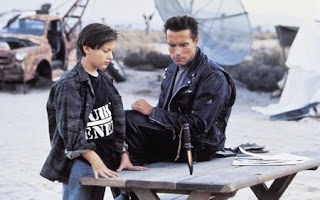Man, I remember first watching The Exorcist years ago and crapping myself. I’ve seen many horror films in my time, read many horror books, been through all that, but this film really, really terrified me. I still maintain it is one of the scariest films I’ve ever seen. (I think Enron: The Smartest Guys In The Room was also one of the scariest films I’ve ever seen, but for entirely different reasons.)
years ago and crapping myself. I’ve seen many horror films in my time, read many horror books, been through all that, but this film really, really terrified me. I still maintain it is one of the scariest films I’ve ever seen. (I think Enron: The Smartest Guys In The Room was also one of the scariest films I’ve ever seen, but for entirely different reasons.)
The book by the same name on which the film is based is similarly scary, though in a ‘I’m-in-the-dark-and-alone-and-it’s-silent-and-it’s-all-taking-place-in-my-head’ way. William Peter Blatty wrote the novel and the screenplay, winning an Oscar for the screenplay and getting another nomination for producing the film, which was directed by Willam Friedkin.
Ellen Burstyn plays actress Chris, mother of Regan (Linda Blair), who is possibly ill, having seizures and the like in Georgetown while Chris is shooting a movie nearby. A whole range of medical tests are conducted on poor young Regan, who is scared herself of what is happening, being as it is that she appears to be possessed, though medical theories ranges from multiple personality disorder to scarring of lobes in her brain - none of which they can actually find evidence for. Eventually, on the advice of a psychologist, she seeks advice on procuring an exorcism from the Catholic Church for her daughter. The medical logic behind this is that Regan appears to believe she is possessed by the devil, and that an exorcism could almost trick her into getting better if she believes it strongly enough.
To this end, Chris approaches Father Karras (Jason Miller), a psychologist and priest working near where Chris has been shooting. He tells her that exorcisms are an old rite that is not practised, but when forced goes to the Church in an attempt to see if they can’t help, even just along the psychological, if not religious lines. The church knows of a priest who has previously performed an exorcism, and summons Father Merrin (Max von Sydow) to Gerogetown to work with Karras, despite Merrin’s old age and the enormous doubts Karras has as to the veracity of Regan’s possession - she is claiming to be inhabited by the Devil himself, rather than just your garden-variety demon as is the norm.
The pair of priests head on in to Regan’s room to begin the exorcism and are confronted by the enormous strength, both mentally and physically, of Regan and whatever it is that may or may not be possessing her (though by this point all involved do seem fairly well convinced that her protestations are reliable.) As the exorcism ends it does seem to become apparent that a demon of some sort, if not the devil himself, was residing within Regan’s young form, as it jumps from her to Karras and, in a moment of self-sacrifice to stop the spread of its evil, he throws himself from Regan’s window onto a steep flight of stairs, killing himself.
The start of the film is of Merrin in Iraq, participating in an archaeological dig, but from the moment the film kicks off back in Georgetown the horror begins, meaning that the film runs almost all of its two hours with these terrifying possibilities forefront for the viewer. Regardless of the fact that the devil’s voice was dubbed by Mercedes McCambridge (she had to sue for credit and this is said to be largely responsible for Blair losing out on her Best Supporting Actress nomination to fellow young’un Tatum O’Neal), Blair’s performance is fairly stunning, considering what she had to do at such a tender age. I don’t think I’ll ever forget her rampaging sexuality and the violent crucifix masturbation sequence.
Burstyn we all love, so I’m not even going to try and talk about how fabulous she is in her Oscar-nominated turn either. Miller, I think, could have been stronger - he was a fairly weak and passive presence for the most part - but von Sydow was terrifically forceful and dominant as the senior priest with all the knowledge and none of the fear.
The script is terrific, something you would hope coming from a good novel by the same writer, and Friedkin keeps the tension super-high for the duration. As much as you might laugh at the vomit or the jerkiness of the head turning or whatever, his ability to achieve so much with so little VFX is pretty terrific. Freezing the set, firing guns behind people to get startled reactions, slapping people to make them angry, breaking Burstyn’s coccyx - he did totally abuse his cast and crew, but damn they got a good movie out of it.
This would probably fit neatly in a top fifty of all time for me, maybe top thirty. I’ve never tried to think about it. Maybe I will someday. But the film has stuck with me since I first watched it, and will now stick with me with much more clarity. But next time, I’m watching it with someone whose arm I can cling to. 5 stars.











